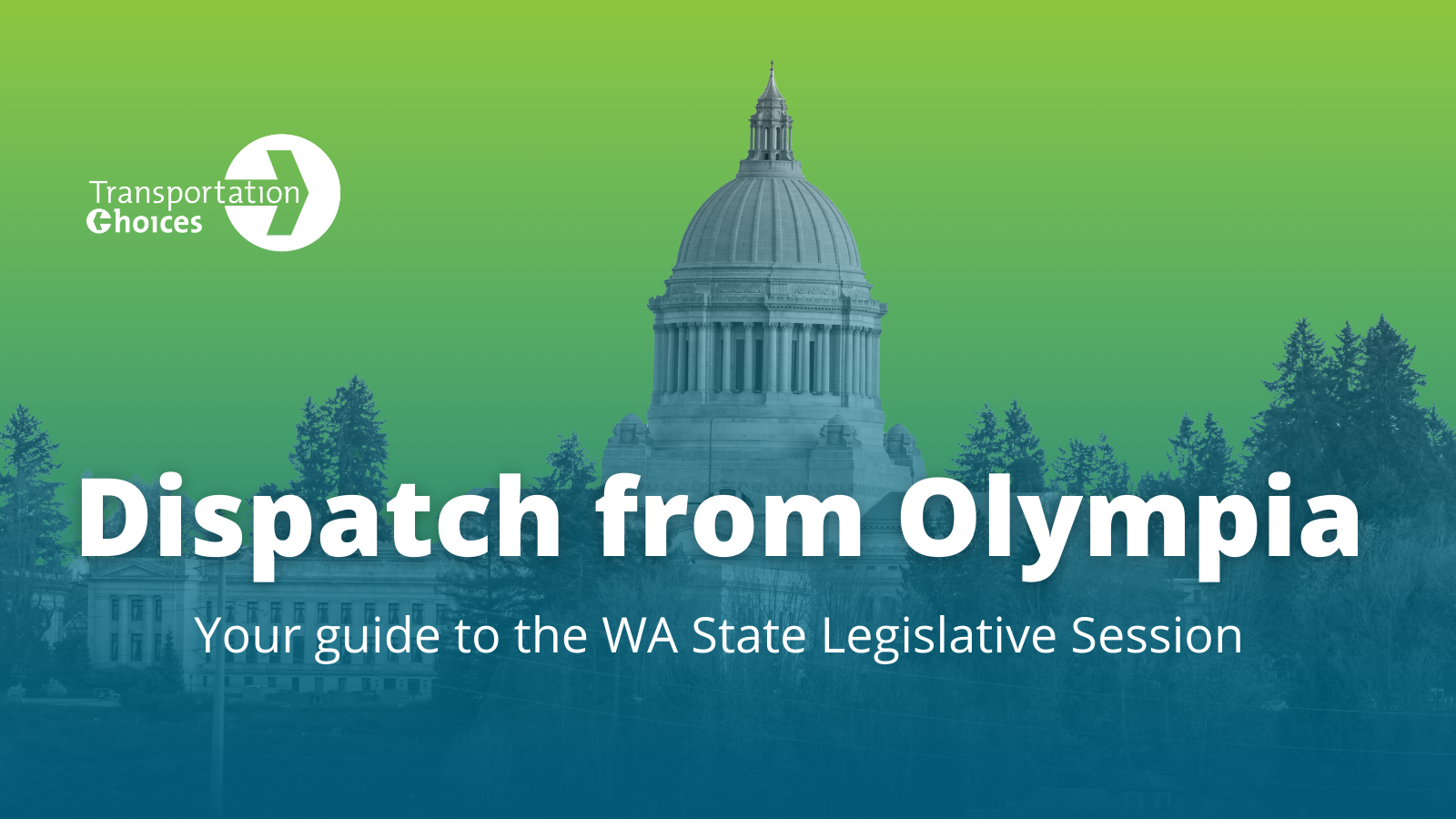
Dear friends,
Last week was a hectic one in Olympia after Washington State legislators released their transportation budget proposals. Each chamber put forward a very different proposal, with some things we like and others we oppose. Below we dig into the details of each, and what changed over the course of the week in response to our collective advocacy.
The House Transportation Budget
The House transportation budget proposes raising new revenue but no new spending. It would backfill money for projects that are already under construction, pause other projects, and make cuts across the board. It includes a lot of revenue ideas that we support, including raising the gas tax and imposing a luxury fee on vehicles. But it also includes cuts to some things that are vital for advancing our state’s climate and equity goals, like Regional Mobility Grants helping to expand transit access and the Commute Trip Reduction program helping more people get to work without driving.
Changes We Helped Win
We spoke to the importance of both the Regional Mobility Grants and Commute Trip Reduction program in testimony to the House Transportation Committee last week, and signed on to a letter with dozens of other organizations, agencies, and local governments to support the Commute Trip Reduction program. We’re happy to report that Regional Mobility Grant funding was partially restored and Commute Trip Reduction funding was fully restored by the House Transportation Committee! We’ll continue to voice our support for both programs. We also want to thank Chair Fey and committee members for listening to testimony and adding funding back into the budget for these priorities.
The Senate Transportation Budget
The Senate transportation budget also proposes raising new revenue, but unlike the House budget, it uses some of that revenue to fund new investments, many of which we like. These include $10 million to expand intercity bus service, $100 million for Green Transit Grants, and $100 million for transit safety investments that focus on things like barriers for operators, better bus stops, and training for transit employees.
We were particularly excited to see $450 million over six years to fund a Megaproject for Safety, which would make critical upgrades on some of Washington’s most dangerous roads. THANK YOU to everyone who voiced your support for this bold investment in safety in response to our Action Alert.
On the flip side, the Senate budget also included a couple of revenue proposals we strongly oppose, including a new surcharge on e-bike purchases and new tolls and vehicle registration fees for buses. We spoke out about these bus and bike taxes in our testimony, and also mobilized people to send more than 15,000 letters to legislators! Thank you to everyone who spoke up and helped spread the word.
Changes We Helped Win
While the bus and bike taxes remain in the Senate Transportation Budget, both have been scaled back from what was originally proposed.
One amendment limited the 10% surcharge on e-bike purchases to Class 3 e-bikes and Class 1 and Class 2 e-bikes that don’t meet UL or EN certifications. As the Seattle Bike Blog notes, most Class 1 and Class 2 e-bikes from reputable companies that are sold at local bike shops would meet these safety certifications, and therefore be exempt from the surcharge. But Class 3 e-bikes (pedal-assisted e-bikes with no throttle and a maximum speed of 28 mph) include many of the cargo bikes that families use to get around without a car. These bikes might seem like luxury items because of their price tags. But for many people and families using them as a primary vehicle, they are a basic necessity that costs much less than a minivan or SUV.
Another amendment limited new bus tolls to bridges and tunnels. But the Senate revenue proposal still looks to collect $33 million over 6 years in vehicle registration fees from transit agencies. While $5.5 million a year might not sound like much, there’s a lot that this money could be better spent on. $5.5 million could fund new shelters for 88 bus stops. It’s equivalent to the entire transit security officer personnel budget at an agency like Community Transit. It’s not worth drawing resources away from agencies providing a vital public service.
We’ll continue to oppose both e-bike and bus taxes as these budgets evolve.
What’s Next?
There’s still a long way to go in the budget process, especially because these proposals are so different. The House and Senate will have to come to an agreement on both revenue and spending. Thankfully there are some things they have in common. For example, both chambers proposed raising the gas tax by some amount, and imposing some form of a luxury tax on vehicles. The chairs will start meeting after April 8th to negotiate and work through the differences in the hopes of coming to an agreement prior to the end of session on April 27th. You can check out the full list of proposed revenue sources from the Senate here and from the House here.
At the same time, we expect more transportation bills to start moving within the next week as we approach the fiscal cutoff on April 8th. Check out our Bill Tracker for the current status of bills we’re tracking, and keep an eye on your email for updates and opportunities to take action.
Ride on!
– Transportation Choices




